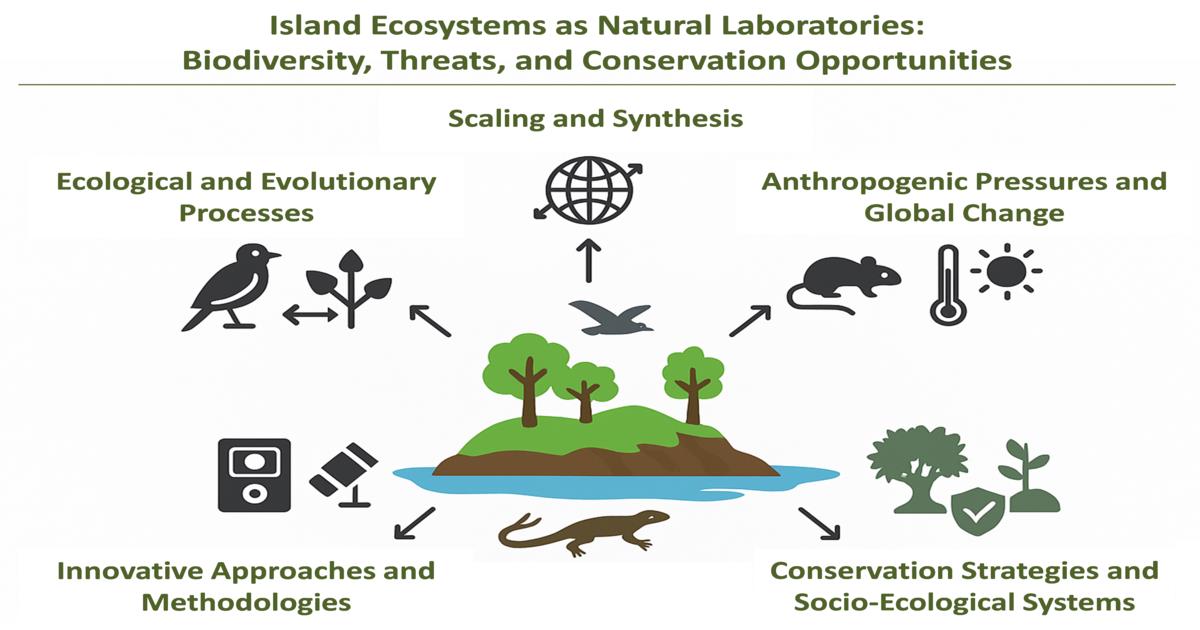- 1.9Impact Factor
- 3.2CiteScore
- 24 daysTime to First Decision
Island Ecosystems as Natural Laboratories: Biodiversity, Threats, and Conservation Opportunities
Special Issue Information
Dear Colleagues,
Island ecosystems are globally recognized as biodiversity hotspots and as “natural laboratories” where ecological and evolutionary processes can be observed with exceptional clarity. Their isolation has fostered high levels of speciation and endemism, while at the same time rendering island biota particularly vulnerable to extinction. In the Anthropocene, islands face disproportionate pressures from invasive species, climate change, land-use transformations, and intensified human–wildlife interactions. Yet, precisely because of their scale, distinctiveness, and tractability, islands provide unparalleled opportunities to test ecological theory, evaluate conservation practices, and develop innovative policy frameworks with global relevance.
This Special Issue seeks to advance the integration of cutting-edge research that leverages the unique attributes of islands to advance ecological understanding and inform conservation science. We invite contributions that span ecological, physiological, and socio-ecological perspectives, ranging from ecological and evolutionary processes, assess species and ecosystem responses to environmental change, and explore innovative conservation strategies.
In this Special Issue, original research articles and reviews are welcome. Research areas may include (but are not limited to) the following:
- Ecological and evolutionary processes;
- Anthropogenic pressures and global change;
- Innovative approaches and methodologies;
- Conservation strategies and socio-ecological systems;
- Scaling and synthesis.
We look forward to receiving your contributions.
Dr. Yiannis G. Zevgolis
Dr. Christodoulos Sazeides
Dr. Giorgos Stavrianakis
Guest Editors
Manuscript Submission Information
Manuscripts should be submitted online at www.mdpi.com by registering and logging in to this website. Once you are registered, click here to go to the submission form. Manuscripts can be submitted until the deadline. All submissions that pass pre-check are peer-reviewed. Accepted papers will be published continuously in the journal (as soon as accepted) and will be listed together on the special issue website. Research articles, review articles as well as short communications are invited. For planned papers, a title and short abstract (about 250 words) can be sent to the Editorial Office for assessment.
Submitted manuscripts should not have been published previously, nor be under consideration for publication elsewhere (except conference proceedings papers). All manuscripts are thoroughly refereed through a single-blind peer-review process. A guide for authors and other relevant information for submission of manuscripts is available on the Instructions for Authors page. Conservation is an international peer-reviewed open access quarterly journal published by MDPI.
Please visit the Instructions for Authors page before submitting a manuscript. The Article Processing Charge (APC) for publication in this open access journal is 1200 CHF (Swiss Francs). Submitted papers should be well formatted and use good English. Authors may use MDPI's English editing service prior to publication or during author revisions.
Keywords
- island ecosystems
- invasive species
- human–wildlife interactions
- climate change impacts
- spatial ecology
- species distribution models (SDMs)
- restoration ecology
- socio-ecological systems
- agroecology
- conservation policy

Benefits of Publishing in a Special Issue
- Ease of navigation: Grouping papers by topic helps scholars navigate broad scope journals more efficiently.
- Greater discoverability: Special Issues support the reach and impact of scientific research. Articles in Special Issues are more discoverable and cited more frequently.
- Expansion of research network: Special Issues facilitate connections among authors, fostering scientific collaborations.
- External promotion: Articles in Special Issues are often promoted through the journal's social media, increasing their visibility.
- e-Book format: Special Issues with more than 10 articles can be published as dedicated e-books, ensuring wide and rapid dissemination.


